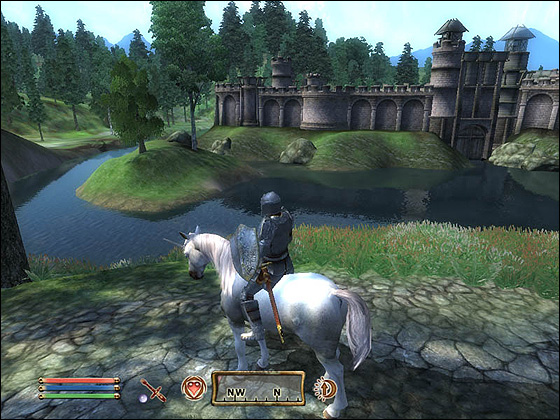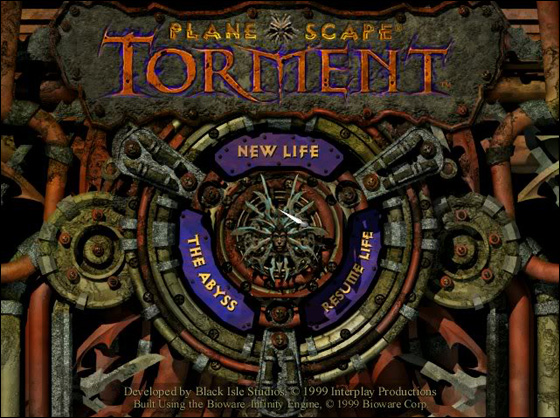Western RPGs: A Checklist of Suppositions
October 20th, 2010
I grew up playing Japanese games and despite the continual global popularity of western games in recent years, I still haven’t really formed a strong taste for them yet (there are exceptions, of course). In fact I only seem to be gravitating even more closer to Japanese games, particularly with the forth-coming release of the 3DS. So, as with my prior phobia of PC games, I’ve decided to take the issue head-on and the first step in dealing with a problem is to talk out the situation. Therefore, I present a Japanese game fan’s interpretation of the nichiest of all western-made games; the western RPG. Later, after downing some of the genre’s classic staples, I will return to this piece and re-address my current suppositions, some of which are obviously a little ignorant (which is the point really).
Western Ideals of Freedom and Democracy
Despite the degradation of democracy over the past few decades due to capitalism and the centralisation of power, westerners still believe in it either as a virtue or a dogma, which goes to say that this large chunk of our ideology permeates into everything we produce, including our video games too.
Many westerner games, not just RPGs, run with this quality of freedom, which leads to more player-driven experiences. From what I can gather there are two main parts to this: the first being the option of rolling one’s own character (therefore assigning themselves to a customisable playstyle), the second is dialogue options which allow players to steer the course of content (choose your own adventure). JRPGs tend to be much more rigid by comparison, offering a grandiose director-controlled narrative . To be honest, customising the avatar and directing my own experience is something I haven’t had too much exposure to, so I’m not all that comfortable with it. Simply put, when I’ve comes across these options in some games, I just choose the less shit option and stick with that.
“High” Contexts
Science fiction and Tolkien-esque fantasy, are popular themes for western RPGs, and to be honest, this scares me a little. From what I can judge, the fiction in these games is inspired by the respective books this brand of fiction is rooted in, and I’ve always had a phobia that I will never understand the science fiction/high fantasy niches. Maybe interacting with these worlds through games will act as a point of access.
Too Much Text and Reading
Lately I’ve clued onto the fact that if not actively engaged in the media I consume then it just turns me off. I suspect that video games have instilled this taste in interactive media and utter boredom with anything else. Consider these examples of consumption habits over the past 6 months:
Movies
Faust, Nosferatu, Metropolis (German, black and white expressionist films)
- When I watch these movies I try to make sense of the metaphors of light and shadow which define this era of cinema
Inception
- It’s like cracking a puzzle as the layers of dream states pile up. Also, the narrative folds and bends, trying to connect the strings while watching is a great pleasure.
Books
- basically I just read books on cultural and social theory
Comics
Watchmen
- I would literally spend a few minutes staring at each individual panel trying to understand the juxtaposition of images and what they symbolise within both the context of the story and in the real culture pertinent to Watchmen‘s theoretical extension of the Nixon era. Then I would go and research the reoccurring themes (vigilante culture, Nixon, America’s relationship with Russia, the cold war, nuclear armourment) to better realise the world of Watchmen.
Music
Massive Attack Discography
-I’ve been listening to Massive Attack for a few years and really dig the thematic elements of their music. Their lyrics are minimal and almost invariably abstract, which allow the interpretations to work as an open slate of theories. I tend to stew over the lyrics and composition to figure out what each song is trying to say and how each song interconnect.
I don’t dig fiction that I can’t get my teeth into. The fact that the player interfaces with characters through menus and text conversation, makes me weary that there will be too much reading and not enough “playing”. And of all things that cut off my enthusiasm to critically mine a game, reading sits right at the top. The games appear to be very rich in context, so it would be disappointing if text cut the thread to some potentially compelling narrative.
Limiting “Real” Choices Which Could Instead Happen Through Gameplay
Dialogue options, their reductiveness in simplifying life down into a few binary decisions really cheeses me off. Why not give the player a toolset of potential interactions which would grant them much wider degrees of expression than 3-4 options from a menu? I guess it comes down to the way these choices are implemented and the weight they have alongside other forms of expression.
The Journal
The next part of this project will be a journal covering my observations of Interplay’s post-apocalyptic RPG Fallout. Stay tunned!






 Game Design Companion: A Critical Analysis of Wario Land 4 - $7.99
Game Design Companion: A Critical Analysis of Wario Land 4 - $7.99 Level Design: Processes and Experiences
Level Design: Processes and Experiences Speed Boost: The Hidden Secrets Behind Arcade Racing Design - $5.99
Speed Boost: The Hidden Secrets Behind Arcade Racing Design - $5.99 Adventures in Games Analysis: Volume I - $5.99
Adventures in Games Analysis: Volume I - $5.99







